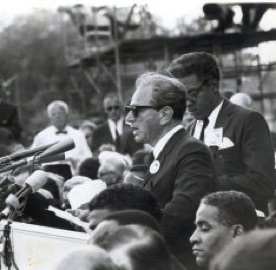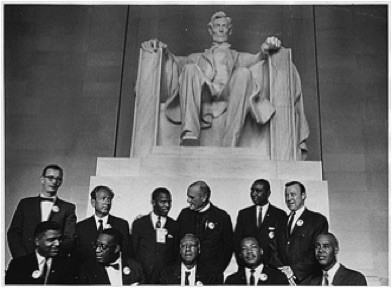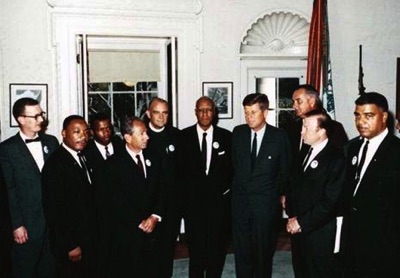

Joachim Prinz devoted much of his life in the United States to the Civil Rights movement. He saw the plight of African American and other minority groups in the context of his own experience as a Jew under the Hitler.
From his early days in Newark, a city with a very large minority community, he spoke from his pulpit about the disgrace of discrimination. He joined the picket lines across America protesting racial prejudice from unequal employment to segregated schools, housing and all other areas of life.
While serving as President of the American Jewish Congress, he represented the Jewish community as an organizer of the August 28, 1963 March on Washington. He came to the podium immediately following a stirring spiritual sung by Mahalia Jackson and just he before Martin Luther King delivered his famous "I have a dream speech." Dr. Prinz' address is remembered for its contention that in the face of discrimination, "the most urgent, the most disgraceful, the most shameful and the most tragic problem is silence."

The Speech
I speak to you as an American Jew.
As Americans we share the profound concern of millions of people about the shame and disgrace of inequality and injustice which make a mockery of the great American idea.
As Jews we bring to this great demonstration, in which thousands of us proudly participate, a two-fold experience -- one of the spirit and one of our history.
In the realm of the spirit, our fathers taught us thousands of years ago that when God created man, he created him as everybody's neighbor. Neighbor is not a geographic term. It is a moral concept. It means our collective responsibility for the preservation of man's dignity and integrity.
From our Jewish historic experience of three and a half thousand years we say:
Our ancient history began with slavery and the yearning for freedom. During the Middle Ages my people lived for a thousand years in the ghettos of Europe . Our modern history begins with a proclamation of emancipation.
It is for these reasons that it is not merely sympathy and compassion for the black people of America that motivates us. It is above all and beyond all such sympathies and emotions a sense of complete identification and solidarity born of our own painful historic experience.
When I was the rabbi of the Jewish community in Berlin under the Hitler regime, I learned many things. The most important thing that I learned under those tragic circumstances was that bigotry and hatred are not the most urgent problem. The most urgent, the most disgraceful, the most shameful and the most tragic problem is silence.
A great people which had created a great civilization had become a nation of silent onlookers. They remained silent in the face of hate, in the face of brutality and in the face of mass murder.
America must not become a nation of onlookers. America must not remain silent. Not merely black America , but all of America . It must speak up and act,. from the President down to the humblest of us, and not for the sake of the Negro, not for the sake of the black community but for the sake of the image, the idea and the aspiration of America itself.
Our children, yours and mine in every school across the land, each morning pledge allegiance to the flag of the United States and to the republic for which it stands. They, the children, speak fervently and innocently of this land as the land of "liberty and justice for all."
The time, I believe, has come to work together — for it is not enough to hope together, and it is not enough to pray together — to work together that this children's oath, pronounced every morning from Maine to California, from North to South, may become. a glorious, unshakeable reality in a morally renewed and united America.


With President Kennedy and the other March leaders
The leaders before the Lincoln statue